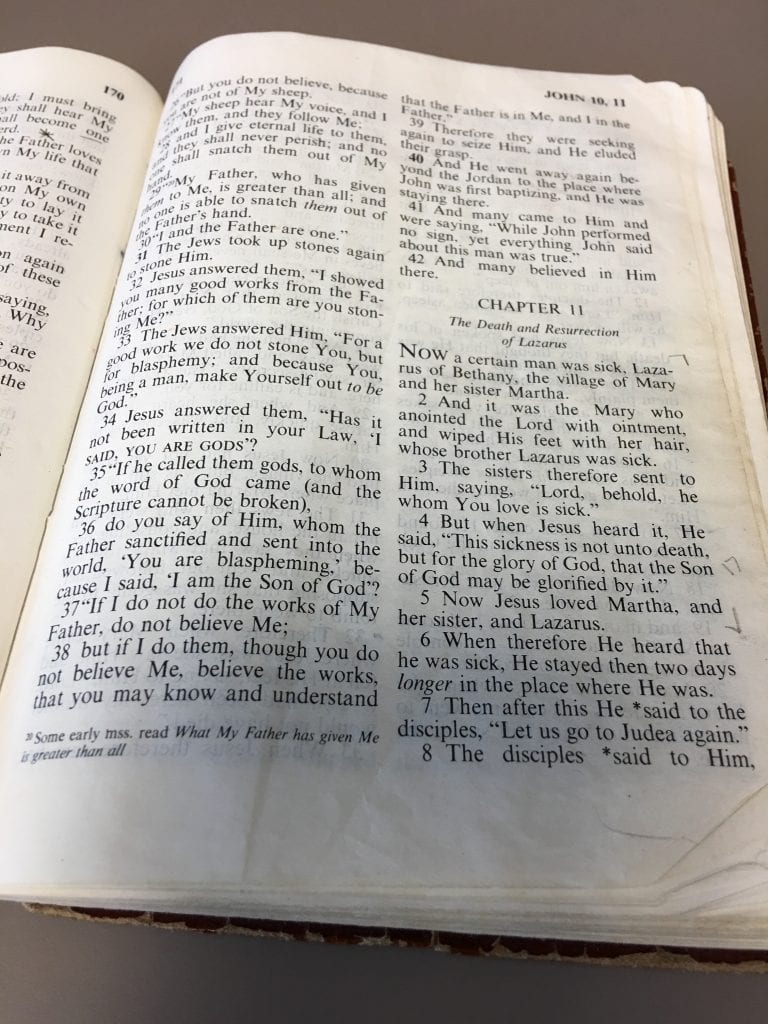
There are many of us who try to live out our lives under the restraint of the moral compass we call Holy Scripture. It is our guide, our rule, our authority… or so we once said. When I was young and growing up Baptist, there was a very rock-solid foundation under my feet and those of my generation. We believed that Bible was, “God’s divinely inspired word which contained truth, without any mixture of error.” We defended it. We attempted to live by it. We longed to handle it accurately. The popular bumper sticker of the day read, “God said it. I believe it. That settles it.”
But the winds of change are starting to blow. If honest, most of us have exchanged the authority of the Word, for the authority of the Spirit. It has been a slow, but very persistent shift. Whether or not God has spoken anew to our generation, or we have just grown uncomfortable with a Bible-ethic that doesn’t fit our agenda, one thing is certain… we have begun to exchange written word, for the Spirit’s voice. We have taught ourselves to view scripture through the lens of the Spirit that dwells within us. As a royal priesthood, we have adopted the right to read and interpret Scripture as the Spirit nudges us. And of course, we think we are right. We believe that our interpretation is “most enlightened” and therefore most correct. We patiently and condescendingly wait on others to catch up. So you see the problem… If we declare to live our lives under the guidance of the Spirit, which can become filtered through our own experiences, biases, and opinions, then is it possible that a conflict may result between the authority of Scripture and the perception of Spirit authority?
Some may well argue that Spirit voice should always trump written word. After all, the Spirit is part of the Godhead, the written word is merely the recorded voice of God. Who’s to say that it too might reflect the biases of those who wrote it? Did the Biblical writers get it right? Is everything written and implied in the text exactly what God chose to communicate?
The other side of the argument follows this logic… Written Word should always trump Spirit voice. The Written Word has stood the test of time, declaring God’s truth for generation upon generation. The truth contained within the pages is set in stone and does not bend according to the popular opinions of modern culture. This logic insists that God’s Word doesn’t change… only our willingness to obey it seems to wax and wane. A defender of the Word would argue that those whose theology stands counter to the faithful witness of Scripture have surely not heard the voice of the Spirit, but rather the voice of self & society that allow for a bending of the rules because it matches their own opinion.
So how does one read the Bible with open-minded, obedient eyes, while allowing room for the Spirit to speak? First, we must decide the answer to this question… “Can the Spirit allow us to develop an interpretation that is contrary to the Written word?” In other words, do the two offer conflicting and competing voices? Will the Spirit really allow for interpretations that are vastly different from what the Bible states? To answer with a resounding “yes” means that Scripture’s voice no longer holds value for us… it is supplanted by the Spirit’s directives. To answer “no” means that we deny the Spirit room for any fresh revelation or insight… moral codes and righteous thought can never change or bend.
So who controls the Spirit? Or better yet… are we controlled by the Spirit or do we attempt to control the Spirit’s voice in our lives? For the sake of argument, let’s affirm that God’s Word and God’s Spirit never conflict with each other. In other words, whatever is written in the Word can only be magnified by the Spirit’s voice. The Spirit will give clarity and conviction to those who take the Word seriously. Such a faith position brings sharper focus but heavier responsibility. Or… for the sake of argument, let’s affirm that God’s Word and God’s Spirit have the room to wrestle with each other and the outcome is not always won by the Word. Sometimes the Spirit speaks louder. Such a position can quickly erode Biblical truth in exchange for our interpretation of truth.
If the Spirit’s role is to guide us in all truth (John 16:13), then how can the two… Word and Spirit… ever compete? Isn’t the same God fully present in both? So maybe the problem is not found in Scripture, nor in Spirit, but in our unwillingness to lean into what both demand of us. If the spirit within you teaches you to bend the rules of Biblical authority, then you’d better be careful of that spirit’s voice. It may not be the voice of God, but rather the serpent’s whisper who again and again says, “You don’t really have to obey God… surely you won’t die.” And suddenly we will find ourselves living somewhere east of Eden.
Let’s be honest… there are some really important issues out there which are testing the mettle of our generation. Read the Word with a conviction that it always speaks truth and intention. And then pray for the clear, crisp voice of the Spirit to give even more insight, so that ambiguity is erased and obedience becomes the watchword of the day.